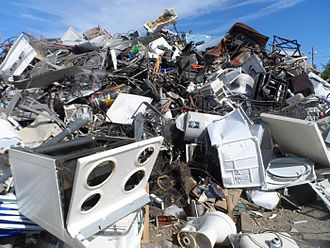
Zero waste, or waste minimization, is a set of principles focused on waste prevention that encourages redesigning resource life cycles so that all products are repurposed (i.e. "up-cycled") and/or reused. The goal of the movement is to avoid sending trash to landfills, incinerators, oceans, or any other part of the environment. Currently 9% of global plastic is recycled.[1] In a zero waste system, all materials are reused until the optimum level of consumption is reached.
Zero waste refers to waste prevention as opposed to end-of-pipe waste management.[2] It is a "whole systems" approach that aims for a massive change in the way materials flow through society, resulting in no waste.[2] Zero waste encompasses more than eliminating waste through reducing, reusing, and recycling. It focuses on restructuring distribution and production systems to reduce waste.[3] Zero waste provides guidelines for continually working towards eliminating waste.[2]
According to the Zero Waste International Alliance (ZWIA), zero waste is the complete recovery of a product's resources "with no discharges to land, water, or air that threaten the environment or human health."[4]
Advocates expect that government regulation is needed to influence industrial choices over product and packaging design, manufacturing processes, and material selection.[5]
Advocates say eliminating waste decreases pollution and can also reduce costs due to the reduced need for raw materials.
- ^ "Plastic pollution is growing relentlessly as waste management and recycling fall short, says OECD". www.oecd.org. 22 February 2022. Retrieved 2022-10-21.
- ^ a b c Snow, W.; Dickinson J. (2001). "The end of waste: Zero waste by 2020" (PDF). Archived from the original (PDF) on 2017-10-30. Retrieved 2014-04-02.
- ^ Davidson, G. (2011). "Waste Management Practices: Literature Review" (PDF). Archived from the original (PDF) on 2012-02-01. Retrieved 2017-09-19.
- ^ "Zero Waste Definition". Zero Waste International Alliance. 7 September 2022 [Original date 24 June 2018]. Retrieved 31 October 2024.
- ^ Townsend, W. K. (2010). "Zero waste: an aspiration or an oxymoron?". Waste Management & Research. 28 (1): 1–3. doi:10.1177/0734242X09356145. PMID 20065044. S2CID 209360875.